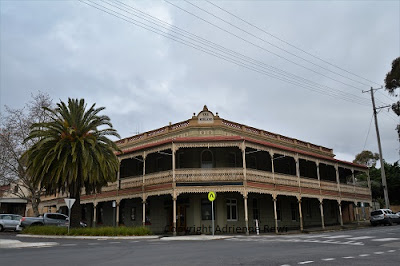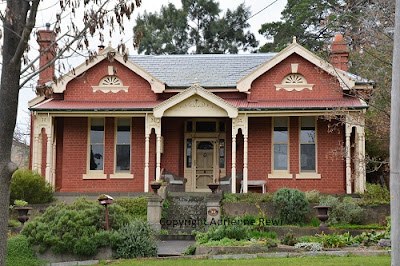Castlemaine
(pronounced ‘Cassle-maine’ by the locals), was trying its best to be warm when
I drove into town just after 9am. The skies were blue but that’s where any hint
of warmth ended. Everyone – and I use the term lightly because there weren’t
many people about – was wearing winter woollies – hats, coats, boots, gloves,
scarves; even the coffee drinkers outside Saff’s Café, where I stopped for my
first cup of light refreshment.
I sat across
the table from a man struggling with the day’s crossword puzzle. I took his
photo and he was so engrossed he didn’t even notice. I wanted to help but
sometimes I find, it pays not to be a ‘foreign’ know-it-all, so I switched my
attention to others – and to the giant cakes that sat under covers on the
counter. Were ‘Castlemainians’ big cake eaters I wondered?
This wasn’t my
first visit to this quirky, historic place. I’ve visited Castlemaine a number
of times before, always in the perishing heat of a Victorian midsummer – so in
that sense at least, the cooler temperatures were welcome. And as I watched
slatted shadows from the window blinds playing across another man’s face, I
wondered if Saff’s was more or less popular than the café (I didn’t choose) in
the converted fire station, or Dot’s. It hadn’t seemed like too much of a
competition at the time but one should never judge a café by its cover.
Like so many
places in these parts, Castlemaine sprang to life as a gold rush boom town in
1851. It was named by the Chief Goldfield Commissioner of the time, Captain W
Wright, who named it in honour of his Irish uncle, the Viscount of Castlemaine.
It sits about 120km northwest of Melbourne, between fellow gold rush towns,
Bendigo and Ballarat; and it has a population of around 9,730.
There’s a very
visible nod to that early goldmining wealth in the historic streetscapes. There
are many impressive buildings - the Town Hall, the Court House, the churches,
the hotels and the dazzling array of domestic architecture that ranges from
cute (and very tiny) gold miners’ cottages, to enormous stately homes. They
were clearly Castlemaine’s ‘good times.’
I was stopped
on a street corner by one old chap, who asked why I was taking photographs.
“Are you from
the local newspaper?” he asked. (Close, but No). He went on to tell me about a
local photographer, who had made it his mission to take photographs of the
town’s buildings, mimicking early historic photos…. a then and now sort of
thing. It seemed like a worthy undertaking. I like a town that looks after its
old buildings.
·
From the
outset, it’s clear that Castlemaine is very good at three things – churches,
pubs and antique shops. It doesn’t do a bad bookshop either – Stoneman’s
Bookroom, Mount of Alex Bookshop, Soldier and Scholar. All three are perfect.
Filled to the brim with every title and topic you could hope for – new, old,
antiquarian, rare, contemporary, interesting, Celtic, children’s, plus a few
more you might not have expected. And outside, walls covered in local notices.
I like a good noticeboard.
You can learn so much about a community from its noticeboards. Everything from cars and vans for sale to contemporary
dance classes, reminders about the Castlemaine Comedy Night, car-boot and
jumble sales, guitar lessons, yoga, even someone trying to get rid of two
K.D.Lang tickets.
Castlemaine Art
Museum is a good stop – apart from the included clutter of the Information
Centre and some rather tacky souvenir stock. Why do souvenir shops everywhere
universally stock the tackiest mementoes? Probably made in Asia and usually
bought by Asians who take them home again. Personally, I think it would be better if the souvenirs just stayed in Asia and local shops stocked something worth buying.
Tack aside, the
Art Gallery was founded in 1913 and is now housed in a handsome Art Deco building,
designed by one Percy Meldrum in 1931. It’s had a number of subsequent
additions but it still presents a commanding front to the street. The gallery’s
permanent collection focuses on Australian art – traditional landscape particularly,
and it has some major works of the late 1800s and the Edwardian.
Unfortunately,
none of the above were on display when I called in. I was instead, treated to
what I assume is the annual Winter Show. And I use the term “treated” loosely.
No matter how I say this, I will sound like a killjoy, so I may as well just
say it - much of the work was abysmal. I’m all for everyone having a go (I’m
even doing that myself at the moment), but perhaps the selection process for
these local exhibitions could be more rigorously observed. For instance, let’s
start with ‘Is this work actually painted well?’’
That said, I’m
glad I went. Quality aside, it’s refreshing to know that so many local people are
involved in the arts – and to be fair, there were some real gems among the
works that I would gladly hang on my own wall.
·
I noted the
proverbial ‘pub on every corner’ – and some not on corners: the Imperial (1861 –
great cellars apparently), the Empyre, the Criterion (1853) [the oldest
continuously licensed premises in Castlemaine], the Midland, the Cumberland and
so it goes on. It should be noted that a number of these are no longer
operating as pubs or hotels but the original buildings are testament to a
rather jolly past.
I looked again
at the mind-boggling Restorers’ Barn – an emporium guaranteed to satisfy every
home restorer on earth. I doubt there is a piece of a house that isn’t included
in this magical place. When some people hear the word Castlemaine, they think
of beer – I just think of the magnificent Restorers’ Barn, which is housed I
might add, in what was once the Mt Alexander Hotel (1864-1907).
And on the
topic of beer, the famous brand Castlemaine XXXX (pronounced for-ex), was
launched in 1924 by Queensland-based Castlemaine Breweries and named after the
town of Castlemaine, where the company was born in 1857. These days, the beer
is actually brewed in Milton, Brisbane by Queensland brewers Castlemaine
Perkins, now a division of Japanese-owned Lion.
·
I could write
all day about Castlemaine – about its quirky secondhand shops (where a rocking camel, a taxidermy frenzy of three cobras crushing a mongoose and an old metal
sign espousing the virtues of Trump utility folding tables and chairs, were my
picks of the day); and I could weave a tale about the pet shop window filled
with buckets full of live crickets and their “Dog Coat Fittings" service.
Mostly, I could wax lyrical about its wonderful architecture. But sometimes, a
few (more) photos are enough.

















No comments:
Post a Comment